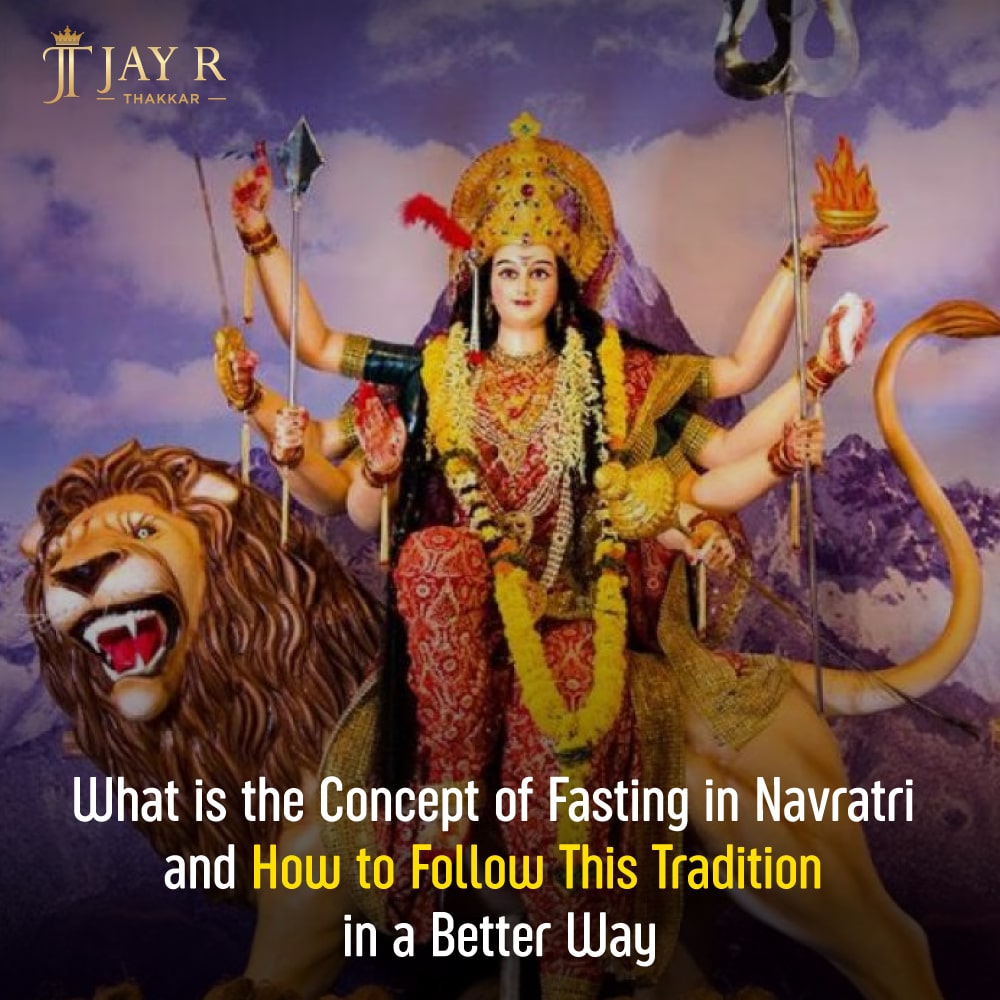
- By: admin
- Comments (0)
- Oct 13
Navratri is one of the most celebrated festivals in India, known for its vibrant Garba dances, devotion to Goddess Durga, and, importantly, the tradition of fasting. Fasting during Navratri is considered a significant spiritual practice and a way to purify the body and mind. For centuries, this tradition has been followed with great devotion by millions of Hindus across the world.
But what is the concept of fasting in Navratri, and how can one follow it in a better way to experience both its spiritual and physical benefits? Let’s explore this deeper.
What is the Concept of Fasting in Navratri?
Fasting during Navratri is not just about abstaining from food but about cleansing the body, mind, and soul. The nine days of Navratri are dedicated to worshipping the nine forms of Goddess Durga, and fasting is a way to show devotion and surrender to the divine energy, known as Shakti.
The concept of fasting during Navratri is deeply rooted in Hindu spirituality. It is believed that by controlling your desires and practicing self-discipline, you can connect more deeply with the divine. Fasting helps in detoxifying the body and focusing the mind on spiritual practices such as prayers and meditation.
Moreover, fasting is seen as a way to honor the change in seasons, as Navratri typically falls during the transition from summer to winter (SharadNavratri). During this time, fasting helps people adjust to the changing climate and boosts immunity.
How to Follow the Tradition of Fasting in Navratri in a Better Way
Fasting during Navratri can be a powerful experience if followed correctly. Here are some simple tips on how to follow the tradition of fasting in Navratri in a better way:
- Understand the Types of Fasts: There are different ways to fast during Navratri. Some people follow a Nirjala fast, where they do not consume even water. Others follow a Phalahar fast, where only fruits and milk are allowed. Then there is the partial fast, where one meal of non-grain food like Sabudana or Kuttu flour is consumed. Choose a fasting style based on your health and devotion.
- Include Nutritious Foods: While fasting, it’s essential to ensure that you maintain your energy levels. You can eat light and sattvic (pure) foods like fruits, nuts, dairy products, and certain grains such as Singharekaatta (water chestnut flour) or Kuttukaatta (buckwheat flour). Avoid heavy or oily food. This not only helps in keeping the body light but also aids in detoxification.
- Stay Hydrated: Drinking water is vital during Navratri fasts, especially if you’re doing a partial fast. You can also include coconut water, lemon juice, or milk to stay hydrated. This will help avoid fatigue and dizziness.
- Avoid Processed and Packaged Foods: Many people rely on packaged snacks during fasting, which can be unhealthy. Instead, opt for fresh, homemade fasting foods. Things like boiled potatoes, fruits, and SabudanaKhichdi are good choices.
- Focus on Spiritual Practices: Navratri is not just about fasting physically but also about spiritual fasting. Engage in prayers, meditation, and chanting to connect with the divine energy of Goddess Durga. The fast is meant to help you focus more on devotion, so setting aside time for prayer and inner reflection is essential.
- Get Proper Rest: Fasting can sometimes make you feel weak, so it’s essential to rest well. Avoid strenuous activities, and take time to relax and rejuvenate your body. Yoga and light exercises can also help in staying fit during the fast.
- Break the Fast Mindfully: On the last day of Navratri or when you are breaking your fast, do it gradually. Don’t overload your body with heavy food. Start with light meals such as fruits or soup before moving on to regular food.
Jay R Thakkar – The King of Navratri Dance
While fasting is a spiritual practice during Navratri, the festival is also well-known for its cultural significance, especially with the beautiful tradition of Garba and Dandiya dances. These dances are performed in honor of Goddess Durga and represent joy, devotion, and togetherness.
When it comes to Navratri dance performances, Jay R Thakkar is a name that stands out. With over three decades of experience entertaining people with his mesmerizing Garba and Dandiya performances, Jay R Thakkar has earned the title of King of Navratri. His passion for the festival, combined with his unmatched energy on stage, makes him one of the best Navratri performers in India.
Whether it’s his graceful dance moves or his ability to connect with the audience, Jay R Thakkar’s performances add a vibrant energy to Navratri celebrations, making him a beloved figure during the festival.
Fasting during Navratri is more than just a religious duty; it is a way to cleanse and purify the body, mind, and soul. When done with the right intention and approach, it can have a positive impact on both your physical and spiritual health. By understanding the concept of fasting in Navratri and following it in a better way, you can make the most of this sacred festival.
As we celebrate Navratri 2024, whether you are fasting or dancing to the beats of Garba and Dandiya, let’s remember the deeper meaning of the festival. With performers like Jay R Thakkar, who is recognized as the Garba King, Navratri continues to be a festival filled with joy, devotion, and tradition.
follow on social Media
Contact us for High-Profile Event Judge in Mumbai:
